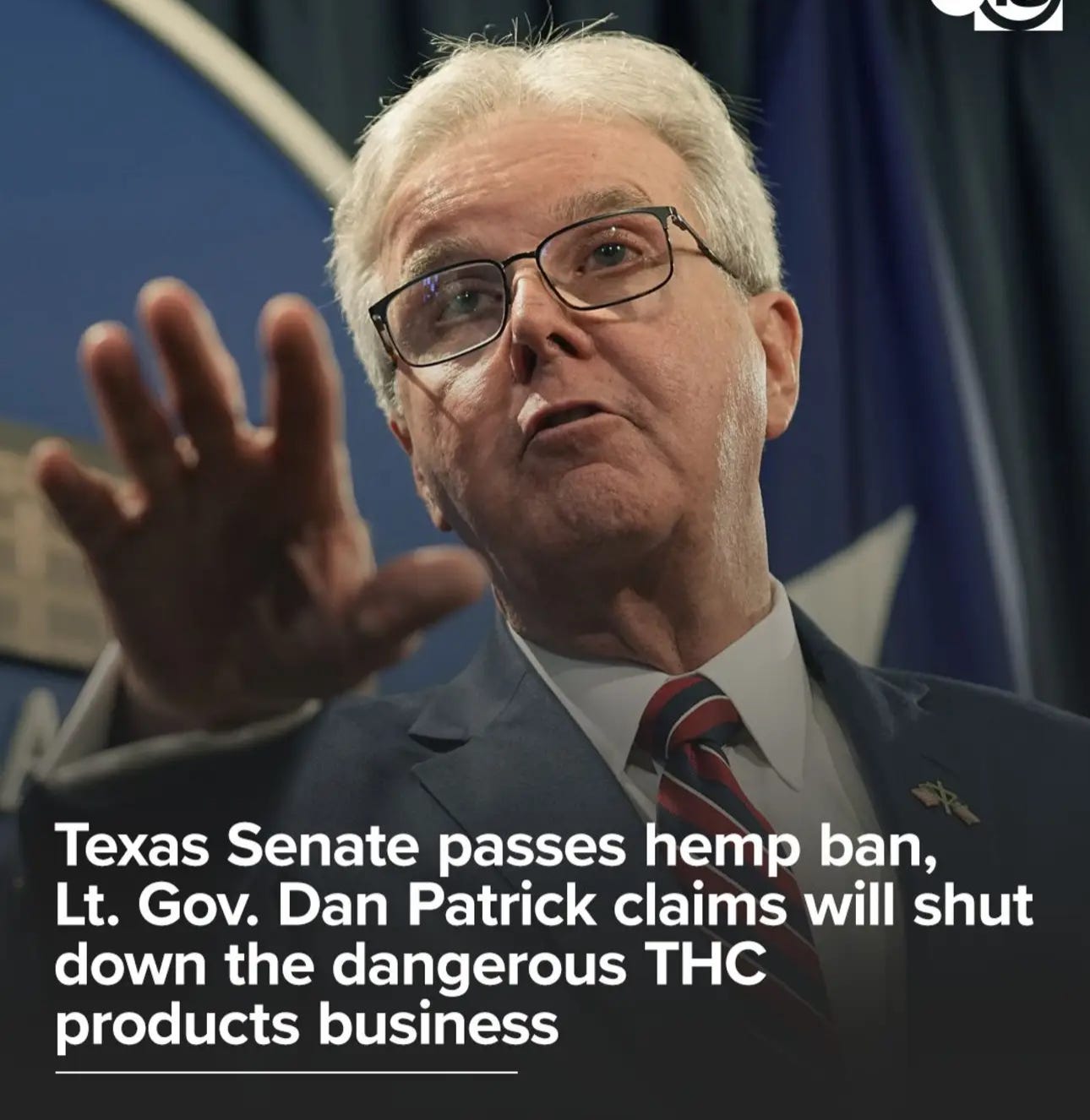Dan Patrick’s War on THC Products is Expected to Create a massive Strain to a Struggling Law Enforcement
The lieutenant governor of Texas, Dan Patrick, is aggressively pushing to ban all consumable THC products in the state through a legislative effort known as Senate Bill 3, arguing that these products pose significant public safety risks due to their unregulated nature and alleged marketing toward children. This "war on THC" is placing a considerable strain on Texas law enforcement, as distinguishing between legal hemp products (containing less than 0.3% THC) and illegal marijuana requires sophisticated lab testing that is both complex and costly. The current infrastructure lacks the capacity to efficiently handle the volume of products needing analysis, forcing law enforcement to divert substantial resources—time, money, and manpower—to enforce such a ban, further stretching already thin budgets and personnel. Economically, this proposed ban threatens Texas’ booming hemp industry, which has become a vital contributor to the state’s economy, supporting thousands of jobs and generating billions in revenue since hemp was legalized in 2019. A total THC ban could devastate this sector, shuttering businesses and eliminating livelihoods, while potentially driving consumers to unregulated black markets, undermining both economic stability and public safety. Critics contend that while safety concerns are legitimate, the economic fallout and enforcement challenges highlight the need for a more balanced regulatory solution rather than an outright ban.
Targeting delta-8 and delta-9 THC products places a notable strain on law enforcement due to the complex and evolving legal landscape, resource demands, and practical challenges of enforcement. The 2018 Farm Bill legalized hemp with less than 0.3% delta-9 THC, creating a loophole that allows hemp-derived delta-8 and delta-9 products to proliferate, often marketed as legal alternatives to marijuana. This ambiguity forces law enforcement to navigate a patchwork of federal and state regulations, where delta-8 is unrestricted in some areas but banned in others, and hemp-derived delta-9 products skirt traditional marijuana laws despite their psychoactive effects.
The burden starts with identification. Delta-8 and delta-9 THC are chemically similar to marijuana’s delta-9 THC, making field testing difficult—standard drug tests often can’t distinguish between them, requiring lab analysis that’s time-consuming and costly. For example, a vape shop raid might seize products labeled as delta-8, but officers can’t confirm legality without forensic testing to verify THC levels and sources, tying up evidence rooms and budgets. Meanwhile, the sheer volume of these products, sold openly in gas stations, online, and CBD shops, overwhelms agencies already stretched thin by traditional drug enforcement.
Resource allocation is another pain point. Pursuing delta products diverts personnel from higher-priority crimes like violent offenses or opioid trafficking. A small-town police department might spend hours on a single delta-8 case—interviewing clerks, securing warrants, and coordinating with labs—only to find the product complies with federal hemp laws, rendering the effort futile. In states like Texas, where hemp is legal but marijuana isn’t, law enforcement faces constant friction with hemp advocates claiming overreach, as seen in disputes between the Texas Hemp Group and local authorities over alleged shop raids.
Enforcement also risks public backlash and legal challenges. When police confiscate delta products, business owners often produce paperwork asserting legality, leading to dropped cases or lawsuits that clog courts and erode trust. The lack of federal clarity—delta-8’s unregulated status versus the DEA’s stance on synthetic THC-O as a controlled substance—leaves officers guessing, while state-level bans add inconsistency. For instance, a sheriff in a delta-8-friendly state might ignore sales, while a neighboring state’s troopers crack down, creating enforcement disparities that confuse the public and strain interagency coordination.
The strain isn’t just logistical—it’s philosophical. Law enforcement must wrestle with whether chasing mildly intoxicating delta-8 gummies aligns with public safety goals, especially when unregulated production poses risks like contamination, yet the “high” is less intense than marijuana’s. With poison control calls rising and 11% of 12th graders reporting delta-8 use in 2023, there’s pressure to act, but the tools and authority remain murky. Ultimately, targeting delta products stretches law enforcement thin, pitting limited resources against a flood of quasi-legal goods in a system not built for such gray areas.

